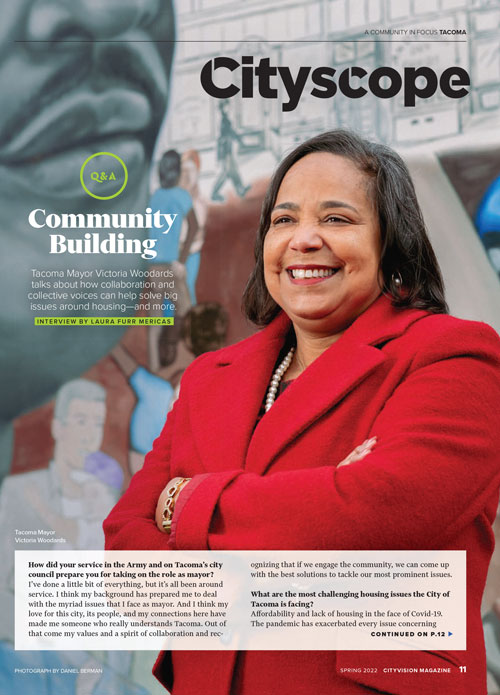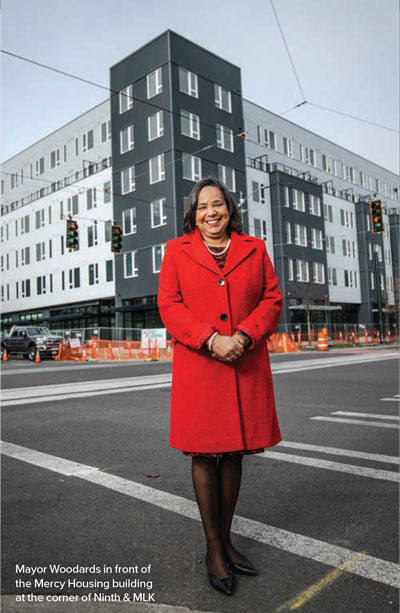Interview by Laura Furr Mericas
How did your service in the Army and on Tacoma’s city council prepare you for taking on the role as mayor?
I’ve done a little bit of everything, but it’s all been around service. I think my background has prepared
me to deal with the myriad issues that I face as mayor. And I think my love for this city, its people, and my connections here have made me someone who really understands Tacoma. Out of that come my values and a spirit of collaboration and recognizing
that if we engage the community, we can come up with the best solutions to tackle our most prominent issues.

What are the most challenging housing issues the City of Tacoma is facing?
Affordability and lack of housing in the face of COVID-19. The pandemic has exacerbated every issue concerning housing, from capacity in homeless shelters
to rising rents and home prices. We’re seeing it play out in a lack of permanent supportive housing and the fact that people who work in our city can’t necessarily afford to live here—our schoolteachers, our servers, even some of
our police and firefighters.
So what have you done about that?
We have implemented our affordable housing action strategy, which focuses on four areas: creating new affordable housing, keeping existing housing affordable and in good repair, helping community
members stay in housing (with initiatives like tenant protections), and reducing barriers.
Such as?
Creating a Housing Trust Fund, purchasing a hotel to provide permanent supportive housing, and completing a disparities study on BIPOC home ownership. We have also implemented the state’s first Guaranteed Income Program,
as well as rental assistance to ensure that community members can maintain their current residence.
What’s had the biggest impact on affordable housing in Tacoma?
The Housing Trust Fund, with over $2 million set aside to help build affordable housing in our community—we’ll see that have impact down the road. I’m
also proud of our nonprofits who provide low- income housing, like our Tacoma Housing Authority, which completed a project about a year ago called The Rise at 19th. And the YWCA just built permanent supportive housing across from their shelter.

Tacoma also helped establish South Sound Housing Affordability Partners. What’s that?
It’s a coalition of governments of all sizes that have come together to access the tools and expertise they need to keep housing attainable for their residents. Because when [housing] is not affordable in Tacoma, people move to Lakewood or Bonney
Lake, and when it’s not affordable in Bonney Lake, then they move further out. I’m really proud that we were able to pull these governments together. It’s a great opportunity for us to leverage our collective voices at the state
and federal level for more tools to be successful in affordable housing.
What’s one thing you learned as mayor that you’ll apply to your new job as the incoming president of the National League of Cities?
That one person cannot solve the issues that face cities, towns, and villages alone.
I’ve learned that the purpose of good ideas in local government is to share them so that all of our communities benefit. The wealth of knowledge that exists in this country in our elected leaders is a resource that will change the world.
“The wealth of knowledge that exists in this country in our elected leaders is a resource that will change the world.”
What excites you most about leading the NLC?
The reality of a nonpartisan organization filled with councilmembers and mayors is that we are focused on who we serve and not ourselves. To lead an organization that is working
hard and advocating on behalf of cities, towns, and villages means that we’re working for communities everywhere. I want to use what I’ve learned in my city, to bring the leadership style that I have and the best practices we’ve
implemented to communities across the country, and to lean on the learnings of other communities, to be able to lift up Tacoma and Washington state.
In addition to affordable housing, what other big issues concerning cities need to be addressed at the national level?
We will still need support to recover from the effects of Covid-19 and adjust to the “new normal.”
Local governments are facing crises in homelessness, public safety, and failing infrastructure; these are issues we cannot solve alone. We are also all still grappling with the national conversation demanding equity in all of our systems,
especially criminal justice. Since these is- sues can be extremely divisive, how we approach them will be extremely important.
